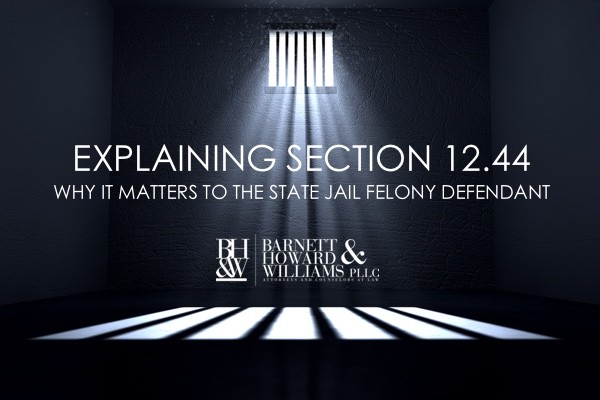 What happens when someone who illegally enters the country commits a crime? Further, does it matter is that person was previously deported from the United States? Does federal law provide for sentencing enhancements to extend the prison terms for wrongdoers in this position? The answer is yes—and no. Read on to see how the Fifth Circuit Court of Appeals analyzes federal statutes and sentencing guidelines that could support such an enhancement for the defendant, but decides against doing so.
What happens when someone who illegally enters the country commits a crime? Further, does it matter is that person was previously deported from the United States? Does federal law provide for sentencing enhancements to extend the prison terms for wrongdoers in this position? The answer is yes—and no. Read on to see how the Fifth Circuit Court of Appeals analyzes federal statutes and sentencing guidelines that could support such an enhancement for the defendant, but decides against doing so.
US v. Rodriguez (5th Circuit, 2016)
A 2002 Theft and Deportation Set the Stage
In 2002, Benito Sanchez-Rodriguez, an “undocumented immigrant,” was convicted in Florida for “Dealing in Stolen Property,” a violation of a state law. Pleading guilty at trial, Rodriguez was sentenced to three years’ imprisonment, which was suspended for three years’ probation. Six months later, he was deported to Mexico because he had no legal status to remain in the US. Over a decade later, in 2014, Rodriguez was arrested for DWI in Texas. While under arrest, the federal government charged him will illegal entry into the US. Ultimately, Rodriguez was indicted on one count of illegal reentry into the US, a violation of federal statute 8 U.S.C. § 1326(a) and (b)(1).
Rodriguez Faces Criminal Charges, Again
In August of 2015, Rodriguez plead guilty to the illegal entry indictment and the district court accepted his plea. Before the sentencing phase, a US Probation Officer prepared a “pre-sentence investigation report” (“PSR”), relying upon the United States Sentencing Guidelines (“USSG”). The PSR assigned Rodriguez base offense level of 8, which was raised by 8 additional levels because of the 2002 “Dealing in Stolen Property” conviction (an aggravated felony qualifier), for a total base offense level of 16. U.S.C. § 2LI.2(b)(1)(C). The PSR added that because Rodriguez took responsibility by entering a guilty plea, the total base offense level was reduced by 3, for a final total of 13. The PSR recommended that with a base offense level of 13, Rodriguez should face between 24 to 30 months in federal prison. Rodriguez objected both on the record and in writing, arguing that the 2002 conviction was not an aggravated felony qualifier, however, the district court adopted the PSR’s recommendations. Accordingly, he was sentenced to 27 months’ imprisonment.
Rodriguez Appeals to the Fifth Circuit, Argues Florida Statute Overbroad
Rodriguez now appeals to the Fifth Circuit for relief, arguing, that the 2002 conviction is not an aggravated felony qualifier for sentencing purposes because the Florida law “Dealing in Stolen Property” is overly broad. The Fifth Circuit must determine whether Rodriguez’s prior 2002 conviction qualifies as an “aggravating felony offense” under the USSG, because if so, he faces a longer prison term and could potentially set a precedent for the federal “aggravated felony qualifier” status of this Florida law.
Federal Law: Sentencing Enhancements
A defendant’s base offense level will be increased by 8 levels if the defendant previously was deported, or unlawfully remained in the US after conviction for an aggravated felony, without regard to the date of the conviction for the aggravated felony. U.S.S.G. § 2LI.2(b)(1)(C); U.S.S.G. § 2LI.2 cmt. N.3(A); United States v. McKinney, 520 F.3d 425, 429 (5th Cir. 2008). An aggravated felony is defined as a “theft offense, including receipt of stolen property, or burglary offense, for which the prison term is at least one year.” 8 U.S.C. § 1101(a)(43)(G).
Federal Cases: Determining Aggravated Felony Qualifiers
A “categorical approach” is used to determine whether a prior conviction is an offense under the USSG. Taylor v. United States, 495 U.S. 575, 602 (1990); United States v. Rodriguez-Negrete, 772 F.3d 221, 224-25 (5th Cir. 2014). Courts compare the elements of a statute forming the basis of the defendant’s conviction with the elements of the generic crime (the offense as it is commonly understood). United States v. Schofield, 802 F.3d 722, 727-28 (5th Cir. 2015). If the offense of conviction has the same elements as the generic crime, then the prior conviction may serve as the predicate, because anyone convicted under that law is guilty of all of the elements. Descamps v. United States, 133 S. Ct. 2276, 2281, 2283 (2013).
Similarly, a “modified categorical approach” is used by courts to analyze the elements of a divisible statute (a criminal statute that is comprised of several varied offenses). In a two-step “modified categorical approach,” the court first reviews indictments and jury instructions, among other documents, to determine which part of a statute formed the basis of a defendant’s prior conviction. Next, the court compares the elements of the crime of conviction with the element of the general crime.
The Fifth Circuit Weighs In
Here, the Fifth Circuit adopted the modified categorical approach to analyze the case. Here, the “generic crime” is a theft offense—the “Dealing in Stolen Property” conviction from 2002. Because the provision does not clearly define “theft offense,” the Fifth Circuit applied the generic definition of theft, “a taking of property or an exercise of control over property without consent with the criminal intent to deprive the owner of rights and benefits of ownership.” United States v. Medina-Torres, 703 F.3d 770, 774 (5th Cir. 2012)(per curiam). Burke v. MuKasey, 509 F.3d 695, 697 (5th Cir. 2007).
The court examined the Florida statute reads, “Traffic means to (a) sell, transfer, distribute, dispense or otherwise dispose of property; (b) to buy, receive, possess, obtain control of, or use property with the intent to sell, transfer, distribute, dispense, or otherwise dispose of property.” Fla. Stat. § 812.012(8). Next, the Court reviewed Rodriguez’s charging document, which read, “Rodriguez knew or should have known that the property was stolen.” The Court examined Florida case law that showed that Florida applies the statute to conduct outside of the generic definition of theft—which created a problem when applying this conviction to the sentencing enhancement provision as outlined in the PSR. Without the enhancement provision, Rodriguez’s sentence would likely not have been as long with a lower base offense level. Accordingly the Fifth Circuit vacates the 27-month prison term and remands the case for resentencing only.










